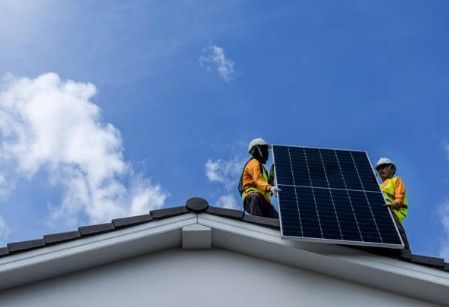Climate Change to Drive Greater Value for Solar Power Installations at Home
Solar power installation at homeis no longer a luxury or an eco-friendly choice. As climate change reshapes our environment, it's becoming a necessary step. Imagine reducing your electric bills while you contribute to a cleaner, more sustainable world.
Key Takeaways:
- As temperatures rise, photovoltaic (PV) modules help save on costs by generating your own electricity.
- Coquitlam's Climate Action Plan promotes PV installations to reduce carbon emissions and cut costs for residents.
- PV panels offer long-term savings and increased value over time, which makes them a worthwhile investment in the future.
Climate Change in Canada
In Canada, every year has been hotter than the 20th-century average, so an entire generation has never known the past "normal" conditions or temperature. This global warming trend isn't unique to Canada; the entire world is experiencing it.
Here's a quick look at the situation:
- Since 1998, every year has been warmer than the 20th-century average.
- More frequent and severe heatwaves are expected, with temperatures up to 10°C higher in parts of Quebec and Atlantic Canada.
- In 2022, Canada ranked as the 11th highest emitter of CO2 globally.
- Temperature change impacts make predicting the weather and managing electric production harder.
Coquitlam's Climate Action Plan with Renewable Energy
Coquitlam is addressing climate shifts with its Environmental Sustainability Plan (ESP), approved in January 2022. The plan concentrates on:
- Downsizing greenhouse gas emissions
- Improving energy efficiency
- Guaranteeing community resiliency
The key part of the city's approach is promoting renewable solutions like installing panels. Encouraging the adoption of solar energy systems aims to lower carbon footprints and reduce electricity costs.
The city works with solar companies and professional solar installers to help residents and businesses install solar panel systems that produce electricity, cut electric consumption, and increase savings.
The Climate Action Plan, which will guide actions through 2030, prioritizes initiatives like solar panel installation to achieve the city's carbon reduction targets. This roadmap guarantees Coquitlam will remain on track to become a more energy-efficient community.
Climate Change and Residential Rooftop Modules: The Study
A 2024 study revealed how temperature shift impacts the value and adoption of solar PV systems in residential installations. This research, using data from over 2,000 households, concentrates on how shifting weather patterns affect the efficiency and cost-effectiveness of solar power systems.
What the study suggests:
- Temperature change could boost the value of rooftop PV by up to 19% by the end of the century.
- The ideal household solar equipment size could increase by up to 25%, which can upgrade production and savings.
- Higher temperatures and increased cooling needs will make hiring solar companies valuable in areas with greater heat.
- The study's findings apply to various Canadian cities, with benefits for homeowners installing panels, especially those with larger cooling needs.
According to the lead author, Mai Shi, "Value here means economic value – how much does a household save on its electric bill when it installs rooftop modules? Our analysis captures how climate change will affect household electric demand through increased cooling demand and household rooftop PV generation."
This study emphasizes the long-term worth of solar installation, including high-quality panels. However, the installation process requires professionals to maximize the electricity generated while lowering utility bills.
How Climate Change Makes PV More Valuable
Photovoltaics benefit homeowners in two major ways: They reduce the need to purchase from the utility and allow them to save more money by shipping excess back to the grid.
Increased Energy Productions
With Coquitlam's 1,932 sun hours, modules (especially high-efficiency monocrystalline solar panels) will generate more electricity. This boost in production makes PV more valuable, especially in Coquitlam with 1294.45 kWh/m2 irradiance.
Rising Cooling Demand
As temperatures increase, electric usage rises. Air conditioning alone accounts for about 6% of total electric generation in North America, which adds to the average household bills. Converting sunlight to direct current can help offset air conditioning demand and lower electricity bills.
Increase Electric Outage
Extreme weather events, like wildfires, heat waves, and hurricanes, are becoming more regular and severe. These events are putting a severe strain on the grid.
Using the sun as a source of electricity offers increased resilience against outages. Paired with battery storage, this is especially valuable, as homes and businesses can disconnect from the grid and operate independently during outages.
Self-Consumption Benefits
A photovoltaic power setup is most valuable when consumed on-site. If you use excess solar energy, you can avoid purchasing from utility companies. This creates potential cost savings, as panels have a higher value when directly consumed rather than fed back into the grid (power purchase agreements).
According to a professor of energy systems at the University of Michigan,
"In general, it's better to consume the electricity you produce than to sell it off to the distribution grid. You basically get paid a better premium for it if you consume it yourself."
Designed for the Future
Given the average 25 to 30-year lifespan of rooftop panels, a system built today will nearly experience 2050 weather. Therefore, it's important to think of future value.
"If households do so, our findings indicate they would see even greater value from photovoltaic power and might decide to build more," said Mai Shi.

It's Time to Leverage Photovoltaic Power
Photovoltaic technology is a smart investment because it offers the potential for long-term savings and environmental advantages. Coquitlam's commitment to renewable energy and carbon reduction aligns perfectly with this transition. If you're ready to reduce your utility bills, contact Coquitlam Solar Energy today to learn more and start maximizing the sun's power.
Frequently Asked Questions
Does photovoltaics still work even after its 25 to 30-year lifespan?
Yes, it still works, but it will lose efficiency in converting sunlight into electricity. The performance declines by 0.5% to 1% per year. After 25 years, it operates at about 75% to 87.5% of its original efficiency.
Can I run my air conditioning on panels?
Yes, you can run an air conditioner using photovoltaic cells. With powerful panels and the right system, it's possible. You might be connected to the grid or off-grid, depending on your setup.
Is it better to invest in batteries for my PV?
Even without battery storage, PVs can still sustain your home. Batteries may be great for storing sun power, which you can use during nighttime or cloudy days and when there is an outage.
CONTACT
Telephone: 604-337-1958
E-mail: info@coquitlamsolarenergy.ca
LOCATION
Coquitlam, BC V3B 0A4, Canada
Coquitlam Solar Energy | All Rights Reserved | 2023
